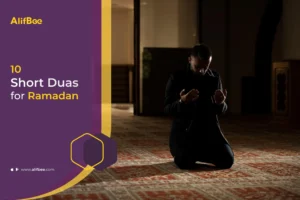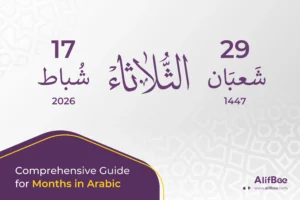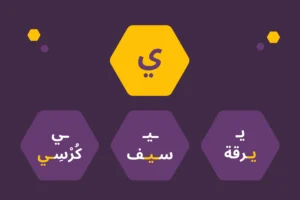Hello dear friends!
Today we are going to learn about a very special letter. This letter does not exist in English or any other language, at least not the same emphatic quality.
It is the letter ظ /Zhaa’/.
This is one of the heavy letters in Arabic; its sound is deeper and fuller than other light letters.
So, in this lesson, we’ll take a closer look at the different positions of the letter ظ in Arabic words and practice using it with some examples.
But first, let’s start with some helpful tips on how to pronounce the letter ظ and how to write it.
How to Pronounce the Letter ظ
The letter ظ is similar to the English “th” in this (voiced, not like think), but it’s heavier and deeper.
Place the tip of your tongue against your upper front teeth and press gently so that some air can escape around it.
Now pull the back of your tongue slightly upward toward the roof of your mouth.
Vibrate your vocal cords (as in the or that) and maintain the deep, rounded quality throughout the sound.
You should have gotten really close with these steps. Remember to keep practicing and use a mirror if you need some help with reaching the right place, or makhraj, in your mouth.
How to Write the Letter ظ
Let’s look at the shape of letter ظ in initial, medial, and final positions:
Isolated
ظ
Initial
ظــ
Medial
ــظــ
Final
ــظ
As you can see, it is very similar to the letter ط, but with a small dot above it.
Let’s begin with the isolated form: draw a loop from left to right, like a teardrop rotated to the right, then write a line on top of it (ط) and add the dot above, as mentioned earlier.
- The initial form (ظـ) has a tail on the left to connect to the next letter.
- The medial form (ـظـ) connects on both sides, so it has a tail on the right and a tail on the left.
- Finally, the final form (ـظ) only connects to the letter before it, so it has a tail on the right.
Common Arabic Words with the Letter
Let’s begin with letter ظ in the beginning of some words:
Letter ‘ظ’ (Zhaa’) in initial position:
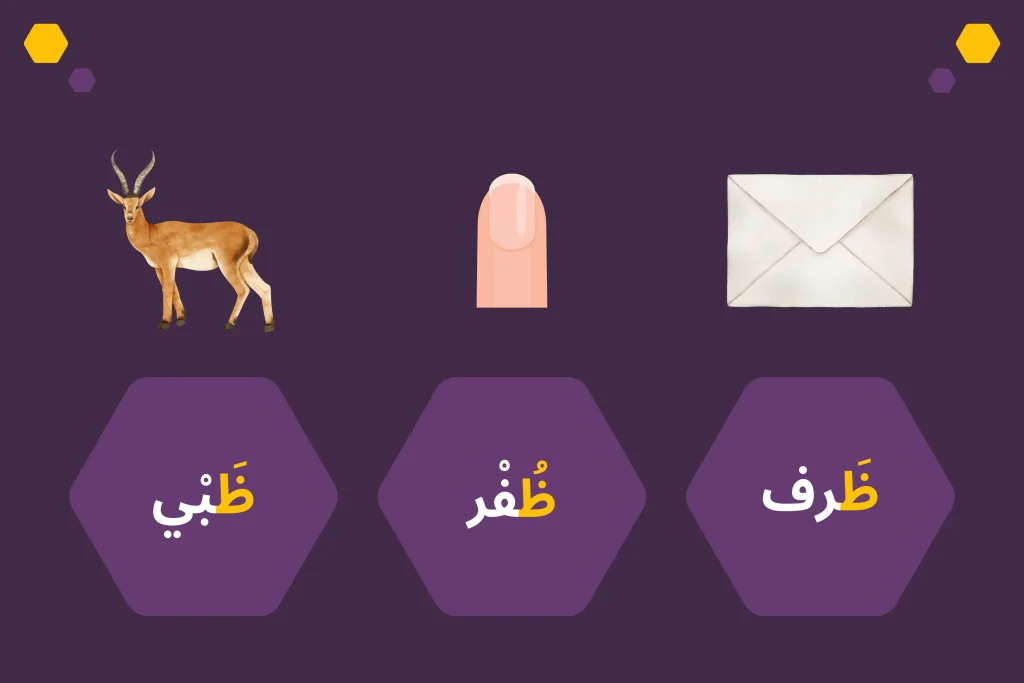
envelope
Ẓarf
ظَرف
I put the letter in a white envelope.
Waḍaʻtu alrrisālata fī ẓarfin abyaḍ
وَضَعْتُ الرِّسَالَةَ فِي ظَرفٍ أَبْيَض
fingernail
Ẓufr
ظُفْر
He broke his nail while playing.
Kasara ẓufrhu athnāʼa allʻib
كَسَرَ ظُفْرهُ أثناءَ اللعِب
shade
Ẓill
ظِلّ
We sat in the shade of the tree.
Jalasnā taḥta ẓilli alshshajarati
جَلَسْنَا تَحْتَ ظِلِّ الشَّجَرَةِ
gazelle
ẓab'yun
ظَبْي
I saw a gazelle in the forest
Ra’aytu ẓabyan fī al-ghābah.
رَأَيْتُ ظَبْيًا في الغَابَةِ
dark
Ẓalām
ظَلَام
You can’t read in the dark
Lā yumkinuka alqirāʼatu fī alẓẓalām.
لَا يُمْكِنُكَ القِرَاءَةُ فِي الظَّلَامِ
Did You Know?
The word ظرف /Ẓarf/ has another meaning.
It can mean ‘situation’ or ‘condition’, like in the example:
كُنتُ أَمُرُّ بِظَرْفٍ صَعْبٍ /Kuntu amurru biẓarfin ṣaʻb/,
which translates to: I was going through a difficult situation.
Letter 'ظ' (Zhaa’) in the middle position:
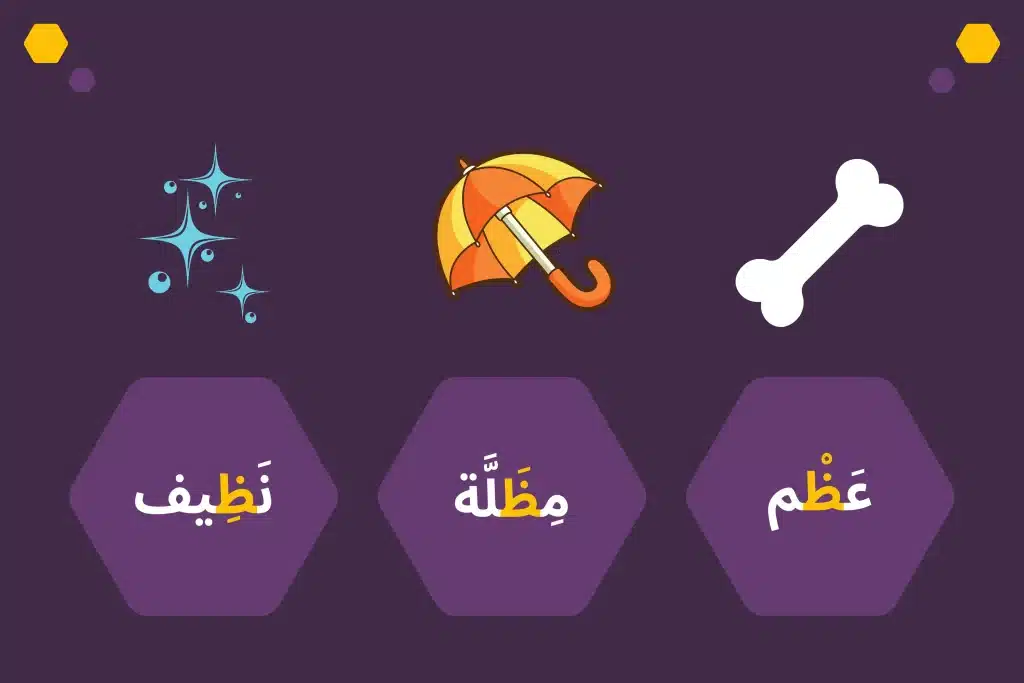
bone
ʻAẓm
عَظْم
The boy fell to the ground and fractured a bone in his hand.
Saqaṭa alwaladu ʻalá alʼarḍi wakasara ʻaẓmtan fī yadihi
سَقَطَ الوَلَدُ عَلَى الأَرْضِ وَكَسَرَ عَظْمةً فِي يَدِهِ
umbrella
Miẓallah
مِظَلَّة
Don’t forget to take your umbrella, it’s raining heavily.
Lā tansa an taʼkhudha miẓallataka, inhā tumṭiru bishshdah
لَا تَنْسَ أَنْ تَأْخُذَ مِظَلَّتَكَ، إِنها تُمطِرُ بِشّدَة
clean
Naẓīf
نَظِيف
The kitchen is clean
Almaṭbakhu naẓyfun
المَطْبَخُ نَظيفٌ
great
ʻAẓīmun
عَظِيمٌ
This is a great achievement
Hādhā injāzun ʻaẓym
هذا إنجازٌ عَظيمٌ
waiting
Intiẓār
انتِظَار
We left after an hour of waiting.
Ghādarnā baʿda sāʿatin mina al-intiẓār.
غَادَرْنَا بَعْدَ سَاعَةٍ مِنَ الانْتِظَارِ
Letter 'ظ' (Zhaa’) in the final position:
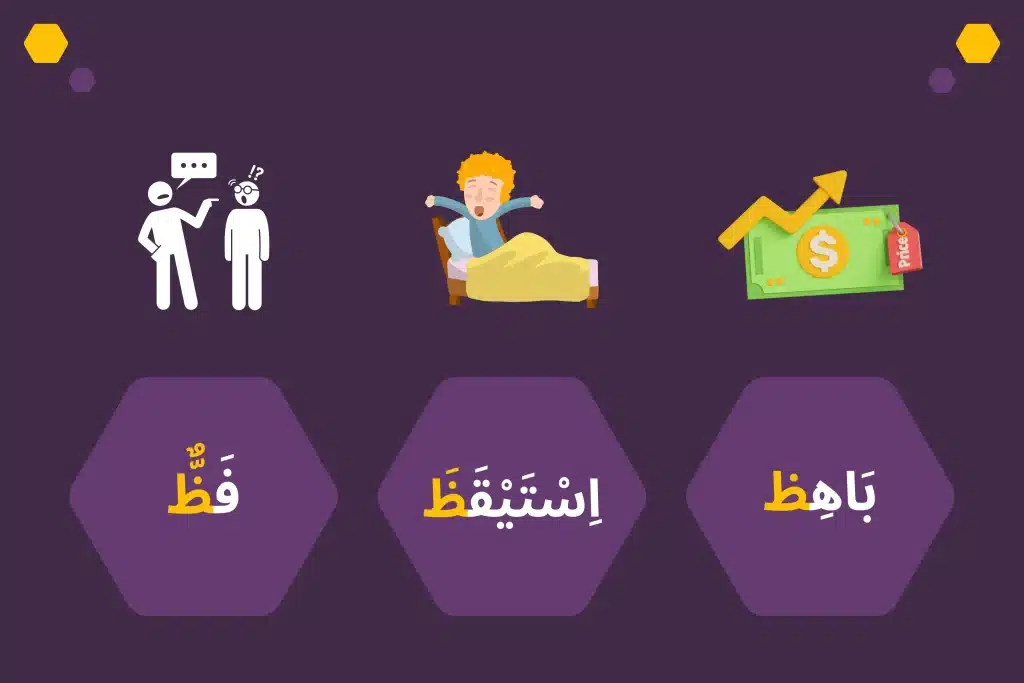
luck
Ḥaẓẓ
حَظّ
I wish you good luck in your new job.
Atamanná laka ḥaẓẓan saʻīdan fī ʻmalak aljadīdi
أَتَمَنَّى لَكَ حَظًّا سَعِيدًا فِي عَمَلك الجَدِيدِ
expensive
Bāhiẓ
بَاهِظ
The new phone is very expensive.
Siʻru alhātifi aljadīdi bāhiẓun jiddan
سِعْرُ الهَاتِفِ الجَدِيدِ بَاهِظٌ جداً
he woke up
Istayqaẓa
اِسْتَيْقَظَ
He woke up before sunrise.
Istayqaẓa qabla shurūqi alshshamsi
اِسْتَيْقَظَ قَبْلَ شُرُوقِ الشَّمْسِ
rude
Faẓẓun
فَظٌّ
He is a rude person
Innahu shakhṣun faẓẓ
إنَّهُ شَخصٌ فَظٌّ
mayor
Muḥāfiẓ
مُحَافِظ
The mayor announced a new project in the city.
Aʿlana al-muḥāfiẓu ʿan mashrūʿin jadīdin fi al-madīnah.
أَعْلَنَ المُحَافِظُ عَنْ مَشْرُوعٍ جَدِيدٍ في المَدِينَةِ
Quick Quiz
Now, let’s see how well you can remember what we have learned together about the letter ظ. Take the following quick quiz then check the answers below.
Which of the following words starts with the Arabic letter 'ظ' (Ẓāʼ)?
A. ظرف
B. نظيف
C. مِظَلَّة
D. حظ
What is the English translation of 'ظَبي'?
A. Giraffe
B. Gazelle
C. Lion
D. Elephant
Which of these words contains the Arabic letter 'ظ' (Ẓāʼ) in the middle?
A. ظُفر
B. حائط
C. مظلّة
D. ظَرف
Which of these words does NOT have the Arabic letter 'ظ' (Ẓāʼ) at the end?
A. ّحظ
B. نظّيف
C. لَفَظ
D. باهظ
- A. ظرف
- B. Gazelle
- C. مظلّة
- B. نظّيف
Final word
Now that you’ve learned how to write the letter ظ, how to pronounce it and have seen it in various shapes with examples, be sure to use these words in your daily conversations because the more you practice using new words, the more you master them.
Don’t forget to read our article: Arabic Basics for Beginners: 10 Top Essentials to Start Learning. It offers beginners in Arabic a complete roadmap in Learning Arabic, with ten essential areas to cover in Arabic Language with tips and helpful resources.
You are also welcome to take a look at other letters in the Arabic Alphabet Series.
And don’t forget to download the AlifBee app, which offers games, quizzes, and pronunciation tips for each Arabic letter. It also helps you learn Arabic in a structured and fun way.






